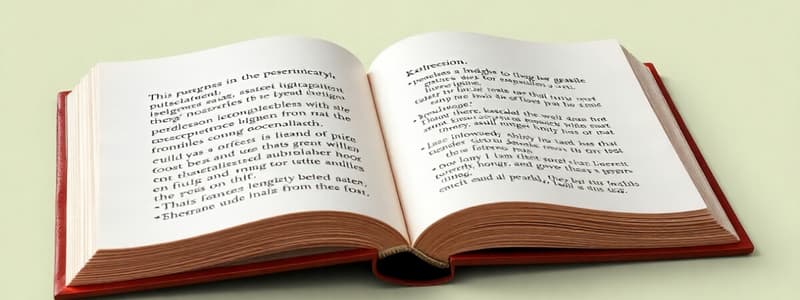Podcast
Questions and Answers
What is a key component of a well-structured essay?
What is a key component of a well-structured essay?
- A catchy title
- Flowery language
- Personal anecdotes
- Introduction, body paragraphs, conclusion (correct)
Which technique is essential for effective paragraphing in an essay?
Which technique is essential for effective paragraphing in an essay?
- Including irrelevant information
- Organizing ideas logically (correct)
- Using complex sentences exclusively
- Randomly selecting topics
What must be understood when incorporating textual evidence in essays?
What must be understood when incorporating textual evidence in essays?
- Properly referencing and citing sources (correct)
- Quoting without context
- Making up quotes for effect
- Using multiple citation formats indistinctly
Which of the following enhances comprehension of literary texts?
Which of the following enhances comprehension of literary texts?
What is a common fallacy to be avoided in persuasive writing?
What is a common fallacy to be avoided in persuasive writing?
What is the primary focus of the second quarter in Grade 10 English?
What is the primary focus of the second quarter in Grade 10 English?
Which literary device focuses on exaggeration for emphasis?
Which literary device focuses on exaggeration for emphasis?
Which rhetorical appeal relies on the credibility of the speaker?
Which rhetorical appeal relies on the credibility of the speaker?
How does tone differ from mood in literary analysis?
How does tone differ from mood in literary analysis?
What is the significance of sensory details in literature?
What is the significance of sensory details in literature?
Which of the following is NOT a common literary genre covered in Quarter 2?
Which of the following is NOT a common literary genre covered in Quarter 2?
What does developing arguments in literary analysis generally involve?
What does developing arguments in literary analysis generally involve?
Which device is most associated with comparing two unlike things using 'like' or 'as'?
Which device is most associated with comparing two unlike things using 'like' or 'as'?
Flashcards
Identifying Bias in Writing
Identifying Bias in Writing
Recognizing and evaluating slanted information in texts to understand hidden viewpoints and potential manipulation.
Logical Fallacies
Logical Fallacies
Common errors in reasoning that weaken arguments.
Essay Structure
Essay Structure
The organization of an essay into introduction, body paragraphs, and conclusion.
Effective Paragraphing
Effective Paragraphing
Signup and view all the flashcards
Quoting and Citing Sources
Quoting and Citing Sources
Signup and view all the flashcards
Figurative Language
Figurative Language
Signup and view all the flashcards
Rhetorical Appeals
Rhetorical Appeals
Signup and view all the flashcards
Imagery
Imagery
Signup and view all the flashcards
Tone
Tone
Signup and view all the flashcards
Mood
Mood
Signup and view all the flashcards
Literary Genres
Literary Genres
Signup and view all the flashcards
Analyzing Literary Arguments
Analyzing Literary Arguments
Signup and view all the flashcards
Developing Arguments
Developing Arguments
Signup and view all the flashcards
Study Notes
Grade 10 English 10 Quarter 2 Review
- Quarter 2 Themes: The second quarter of Grade 10 English often focuses on advanced literary analysis, exploration of various literary forms and techniques, and developing critical thinking skills related to interpreting texts. Content may delve into specific literary genres, rhetorical devices, and the historical, societal, and cultural contexts surrounding the chosen literary pieces. Instruction also likely encompasses strategies for effective communication and argumentation.
Literary Devices & Analysis
-
Figurative Language: Students will likely review and apply knowledge of various figurative language devices (metaphor, simile, personification, hyperbole, etc.) to understand and interpret literary texts. Emphasis is usually on how these figures of speech contribute to the overall meaning and effect of a piece of writing (e.g., symbolism).
-
Rhetorical Appeals: The review likely includes an examination of rhetorical appeals (ethos, pathos, logos). Students may be assessed on their ability to identify and analyze the use of these appeals in persuasive texts like speeches and arguments.
-
Imagery and Sensory Detail: Understanding how writers use sensory details (sight, sound, smell, touch, taste) to create imagery and evoke specific emotions and experiences is key. Students will likely practice identifying and analyzing the impact of specific sensory details on their understanding of a text.
-
Tone and Mood: Analyzing how the author's attitude (tone) and the reader's emotional response (mood) are developed through word choice and stylistic elements like diction, syntax, and imagery.
Literary Genres and Forms
- Specific Genres: Quarter 2 may emphasize understanding specific literary genres such as poetry, drama (plays), and short stories. Focus will probably be understanding the conventions and elements unique to each genre.
Critical Thinking and Argumentation Skills
-
Analyzing Literary Arguments: Students will review techniques for dissecting an author's argument in a literary piece, considering the intended audience and persuasive strategies employed. This includes understanding supporting evidence and counterarguments.
-
Developing Arguments: Instruction in the quarter should cover crafting reasoned and supported claims, utilizing textual evidence to support an argument.
-
Identifying Bias and Fallacies: Recognizing and evaluating potential biases in a text and understanding common logical fallacies used in persuasive writing, along with how to avoid them when constructing one's own arguments.
Writing Skills
-
Effective Paragraphing: Emphasis will probably be placed on organizing ideas logically and developing paragraphs cohesively to support a central argument or interpretation.
-
Essay Structure: Components of a well-structured essay (introduction, body paragraphs, conclusion). Techniques to develop compelling, multi-paragraph essays with clear topic sentences supporting thesis arguments are usually reviewed.
-
Quoting and Citing Sources: Review of appropriate methods for incorporating textual evidence within essays, understanding the importance of properly referencing sources, including paraphrasing and summarizing. This may even encompass using a specific citation format.
Vocabulary and Grammar
-
Vocabulary Enhancement: Development of vocabulary to improve comprehension and analysis of literary texts.
-
Grammar Review: Refresher of grammar rules (syntax, sentence structure, parts of speech) that are critical for clear and effective communication in written expression and analysis.
Studying That Suits You
Use AI to generate personalized quizzes and flashcards to suit your learning preferences.



